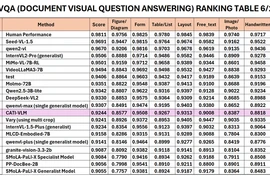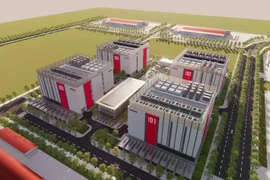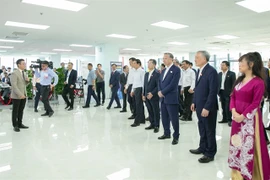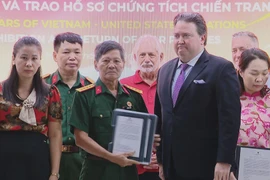HCM City (VNS/VNA) - Vietnamese tech firm CMC Corporation has received approval to build a 250 million USD data centre at the Saigon Hi-Tech Park (SHTP).
The centre will initially operate at a capacity of 30MW and is expected to scale up to 120MW, serving the huge computing needs for AI development and the digital economy sector of the city.
According to a representative of CMC, the centre is designed for massive data storage, computation and analytics, providing services such as AI-as-a-Service, Cloud infrastructure, Big Data and cyber security to millions of users.
The centre will integrate new-generation network technologies and 800G DWDM optical transmission, ensuring ultra-high bandwidth, and stable and secure connections across the network.
CMC also plans to apply Digital Twin technology to simulate and monitor the centre’s operations in real time.
Besides that, renewable energy solutions will be prioritised to reduce power consumption and meet green data centre standards.
Nguyen Trung Chinh, Chairman and CEO of CMC Corporation, said that the project is a core infrastructure project to support HCM City to become a regional digital hub.
“This will provide Vietnamese enterprises with strong computing resources without needing to send data overseas,” he said.
The data centre is expected to attract AI ecosystems, including R&D centres, start-ups, investors and technology universities.
This will support the city’s goal to become Vietnam’s first AI city and a digital hub for the region./.

See more
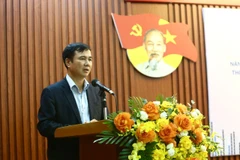
Measures sought to enhance innovation policy evaluation in Vietnam
In the context as Vietnam is promoting institutional reform, the development of policies based on an efficiency assessment mechanism is an urgent requirement to ensure focused investments.

Phu Quoc special zone advances toward smart urban centre
To serve both the two-tier local government operations and the APEC 2027 Leaders’ Week, An Giang is implementing a major tech infrastructure project on Phu Quoc Island, with a total investment of 500 billion VND (19.1 million USD).

Deputy PM urges stronger push for smart city development
The Deputy PM applauded the task force’s preparation, stressing that smart urban development is not a choice but an inevitable trend for countries aiming for sustainable growth, improving the quality of life for people, and strengthening urban governance and operation.
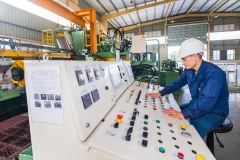
More opportunities offered for investors in science, technology
Public-private partnerships are expected to create positive synergy, while also placing greater responsibility on private investors in managing and developing projects. This approach helps ensure the effective use of public funds to advance science and technology, foster innovation, and drive digital transformation.
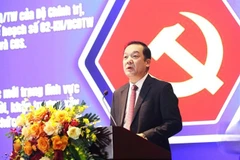
Over 75,000 digital technology enterprises operating stably in Vietnam
Vietnam ranked 44th out of 133 economies in the Global Innovation Index 2024, up two places from the previous year, and retained its leading position among lower middle-income countries.

Hanoi to establish innovation centre as joint stock company to drive tech-led growth
The Hanoi Innovation Centre is expected to help concentrate resources and create breakthroughs for rapid and sustainable growth.

HCM City embraces digital technologies to curb IUU fishing
Across the city’s coastal communities, local authorities are adopting specialised digital applications to manage fishing vessels, monitor catch data, and support traceability efforts.
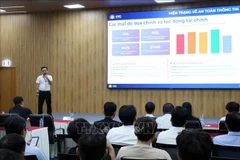
AI brings breakthrough opportunities, cybersecurity risks, experts warn
A report from Fortinet in June revealed that automated scanning attempts had surged to 36,000 per second, a 17% increase from the previous year. Alarmingly, 42% of these were account takeover attacks, and leaks involving 1.7 billion sets of credentials. In Vietnam, data from the National Cybersecurity Association showed that 659,000 cyberattacks were recorded in 2024, affecting approximately 46.15% of government agencies and enterprises.
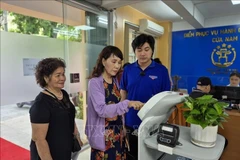
Hanoi’s Cua Nam ward introduces AI robot to support public services
The introduction of AI robots marks a key step in Hanoi’s efforts to streamline administrative processes, modernise public services, and build a more citizen-friendly government.
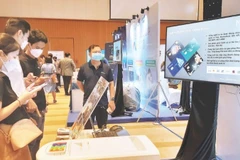
AI offers breakthrough opportunities for businesses
Under the Poliburo’s Resolution 57-NQ/TW on breakthroughs in science, technology, innovation, and national digital transformation, Vietnam aims to be among the top three ASEAN countries and the top 50 globally in AI development by 2030.
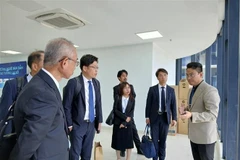
Da Nang offers favourable policies to boost startups, innovation
With the ambition to become a leading startup and innovation hub in Vietnam and Southeast Asia by 2030, Da Nang has implemented a range of incentives and actively promoted investment in its innovation ecosystem.
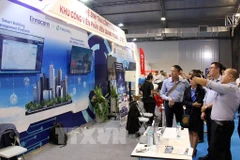
iTech Expo 2025 opens in HCM City with over 120 booths
Showcased technologies include AI, IoT, Big Data, drones, robotics, Holobox, and sector-specific solutions such as EdTech, AgriTech, FinTech, and cybersecurity. A dedicated zone for startups also forms part of the exhibition.
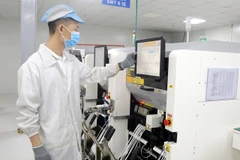
Vietnam to offer unprecedented incentives for digital tech companies
According to the Law on Digital Technology Industry, the incentives include full corporate income tax exemption for the first two years and 50 % reduction in the four following years, as well as land rent waivers for three years.
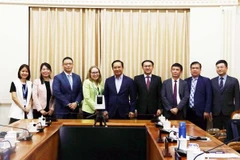
HCM City, Intel cooperate in training AI human resources
Kenneth Tse, General Director of Intel Vietnam, noted that in nearly 20 years of operations in the country, Intel Vietnam has exported over 4 billion products, contributing more than 100 billion USD to Vietnam’s export revenue.
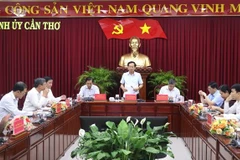
Can Tho, GenAI Fund team up for AI-driven transformation
The fund plans to assist Can Tho through a comprehensive set of initiatives such as the “Digital Transformation for All” programme to promote digital literacy; AI training for public officials and businesses; startup incubation and co-investment; and financial support for AI research and innovation. Additional support includes providing free working spaces for AI developers and formulating a region-specific AI strategy.
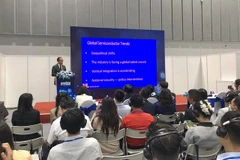
Vietnam, one of most promising players on global semiconductor landscape
Amid growing global demand, fragile supply chains and intensifying geopolitical conflicts, Vietnam is rapidly emerging as one of the most promising players in the global semiconductor landscape, a seminar heard in Ho Chi Minh City on July 2.

Vietnam sets out incentives for PPPs in sci-tech development
Key areas eligible for PPPs include high and strategic technologies; infrastructure for the research, development, and application of high and strategic technologies; and digital infrastructure supporting the digital economy, digital society, and digital government.
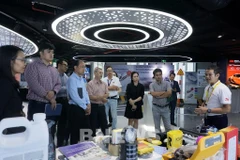
Advanced technology solutions ready for North–South high-speed railway project
During the visit, the parties exchanged ideas on high-tech material solutions and technologies that could be applied to national strategic transport infrastructure projects, particularly the North–South high-speed railway project.

Party chief calls for stronger efforts in innovation, digital transformation
General Secretary Lam also emphasised the need to immediately issue policies to attract and retain high-level domestic and overseas talents, particularly in critical fields like AI, semiconductors, and advanced materials.

Data-driven science, technology, innovation given special incentives
In addition, the decree encourages the development of research centres focused on data science and innovation in areas such as artificial intelligence (AI), cloud computing, blockchain, data communications, the Internet of Things (IoT), big data, and other advanced technologies in order to build, develop, protect, manage, process, and utilise data effectively.
